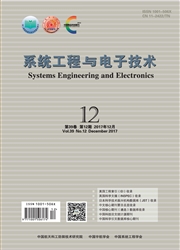

 中文摘要:
中文摘要:
In a reliability comparative test, the joint censoring model is usually adopted to evaluate the performances of units with the same facility. However, most researchers ignore the possibility that there is more than one factor for the failure when a test unit fails. To solve this problem, we consider a joint Type-II hybrid censoring model for the analysis of exponential competing failure data. Based on the maximum likelihood theory, we compute the maximum likelihood estimators(MLEs) of parameters and then obtain the condition ensuring MLEs existence for every unknown parameter. Then we derive the conditional exact distributions and corresponding moment properties for parameters by the moment generating function(MGF). A Monte-Carlo simulation is conducted to compare the performances of different ways. And finally, we conduct a numerical example to illustrate the proposed method.
 英文摘要:
英文摘要:
In a reliability comparative test, the joint censoring model is usually adopted to evaluate the performances of units with the same facility. However, most researchers ignore the pos- sibility that there is more than one factor for the failure when a test unit fails. To solve this problem, we consider a joint Type-II hybrid censoring model for the analysis of exponential competing failure data. Based on the maximum likelihood theory, we compute the maximum likelihood estimators (MLEs) of parameters and then obtain the condition ensuring MLEs existence for every unknown parameter. Then we derive the conditional exact distributions and corresponding moment properties for parameters by the moment generating function (MGF). A Monte-Carlo simulation is conducted to compare the performances of different ways. And finally, we conduct a numerical example to illustrate the proposed method.
 同期刊论文项目
同期刊论文项目
 同项目期刊论文
同项目期刊论文
 Asymptotically optimal empirical bayes estimator of parameter from burr-xii distribution under progr
Asymptotically optimal empirical bayes estimator of parameter from burr-xii distribution under progr Reliability analysis for accelerated life-test with progressive hybrid censored data using Geometric
Reliability analysis for accelerated life-test with progressive hybrid censored data using Geometric Inference for constant-stress accelerated life test with Type-I progressively hybrid censored data f
Inference for constant-stress accelerated life test with Type-I progressively hybrid censored data f Reliability analysis based on progressively first-failure-censored samples for the proportional haza
Reliability analysis based on progressively first-failure-censored samples for the proportional haza Statistical Analysis of Dependent Competing Risks Model in Accelerated Life Testing under Progressiv
Statistical Analysis of Dependent Competing Risks Model in Accelerated Life Testing under Progressiv Analysis of masked data in a series systemsubjected to sources of shocks under type-I progressive hy
Analysis of masked data in a series systemsubjected to sources of shocks under type-I progressive hy Accelerated LifeTests for Log-normal Series System with Dependent Masked Data under Type-I Progressi
Accelerated LifeTests for Log-normal Series System with Dependent Masked Data under Type-I Progressi Estimation for Birnbaum Saunders Distribution in Simple Step stress accelerated Life Testwith Type-I
Estimation for Birnbaum Saunders Distribution in Simple Step stress accelerated Life Testwith Type-I Bayesian Analysis for Burr-XII Masked System in Step-Stress Partially Accelerated Life Test underTyp
Bayesian Analysis for Burr-XII Masked System in Step-Stress Partially Accelerated Life Test underTyp Bayesian Reliability Analysis for Burr XII Component in Series System Using Dependent Masked Life Da
Bayesian Reliability Analysis for Burr XII Component in Series System Using Dependent Masked Life Da Statistical Analysis in Constant-stress Accelerated Life Tests for Generalized Exponential Distribut
Statistical Analysis in Constant-stress Accelerated Life Tests for Generalized Exponential Distribut Inference for accelerated competing failure models from Weibull distribution under Type-I progressiv
Inference for accelerated competing failure models from Weibull distribution under Type-I progressiv Estimation and Optimal Plan in Step-Stress Partially Accelerated LifeTest Model with Progressive Hyb
Estimation and Optimal Plan in Step-Stress Partially Accelerated LifeTest Model with Progressive Hyb 期刊信息
期刊信息
